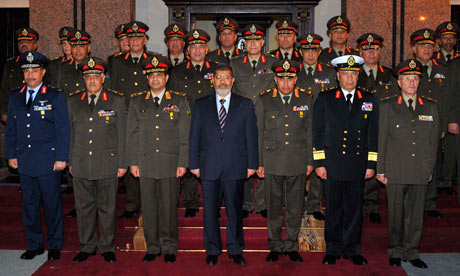By Justin Dorman
Impunity Watch Reporter, Middle East
CAIRO, Egypt – Impunity is defined as “exemption from punishment or freedom from the injurious consequences of an action.” Issues of impunity generally arise when a government injures its own people and refuses to punish itself. Sometimes, like in the case of modern day Egypt, a separate group will cause the injury while the government will pretend the atrocities never happened.

It was just a week ago that Egypt’s president, Mohamed Morsi was covertly investigating accusations of military malpractice. Accusations of acts committed since the 2011 uprising included torture, killings, and abductions of Egyptians. Additionally, army doctors were reported to have been ordered to operate on patients without any anesthetic.
The investigation was leaked, and instead of substantiating the claims to the public, Morsi denied that any bad acts transpired that could feasibly besmirch the name of the Egyptian military. Morsi took his protection of the military one step further and actually promoted several generals to lieutenant-generals.
Morsi announced to the public, “any insult against the armed forces is an insult against all of us, and we reject any kind of insults . . . I announce this to the whole world: we appreciate the great role that the armed forces has been playing in maintaining the safety and security of this country.”
This was followed by General Abdel Fattah Sisi declaring that, “the armed forces during the last two years was very, very fond of Egypt and the people of Egypt and did not commit any malpractices what so ever.” He added, “by God I swear that the army, since 25 January 2011, did not kill and did not order to kill, did not deceive and did not order to deceive.”
Why after investigating and learning of military misconduct did Morsi defend the military so vigorously?
Because after studying the careers of Anwar Sadat and Hosni Mubarak, Morsi learned that in this game of pharaoh thrones, you either win or you die or you find yourself in Torah Prison.
Many interpret virtually all maneuvers by Morsi as power plays. Immediately after being elected, he took away a great amount of power from the military who were ruling the country.
Morsi tried to make concessions to keep the military happy by allowing them to try civilians in military court and allegedly striking a deal to stay out of their affairs in exchange for their support. Nonetheless, Morsi must have feared what Professor Robert Springborg, expert on Egyptian military feared; that with the economic situation deteriorating, and a utter lack of political stability, that amongst threats to the military, the military was eventually going to re-insert itself into Egyptian politics at the Muslim Brotherhood’s expense.
As a result of another alleged power play, Morsi’s nephew has recently been admitted into a military training academy. This has been interpreted by Springborg as a message that the Muslim Brotherhood is going to move in on the military. A keep your friends close, but your enemies even closer type of move.
Springborg may have the correct interpretation of this maneuver. Perhaps though, the boy just seeks to serve the realm of Egypt.
For further information, please see:
ABC News – Egypt top General, President Deny Army Abuse Claim – 12 April 2013
Guardian – Mohamed Morsi Backs Egyptian Military After Malpractice Allegations – 12 April 2013
Naharnet News Desk – Egpytian Protesters Operated on Without Anesthetic – 12 April 2013
New York Times – Leaked Report to Egypt’s President Implicates Army in Torture and Killing of Civilians – 10 April 2013